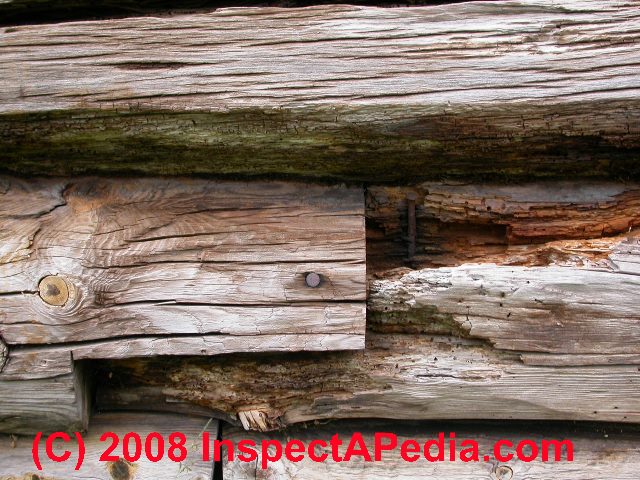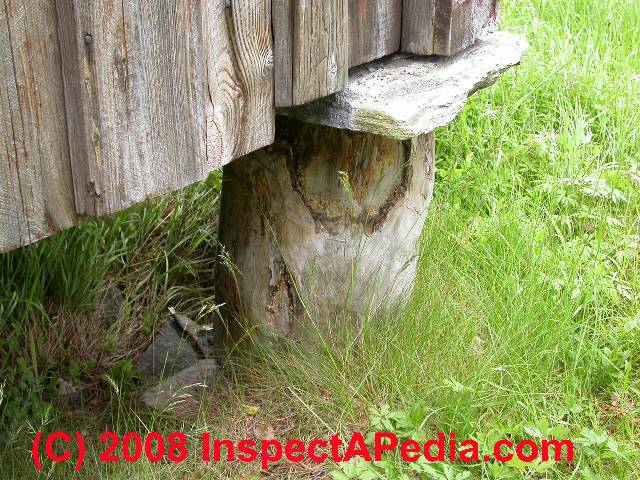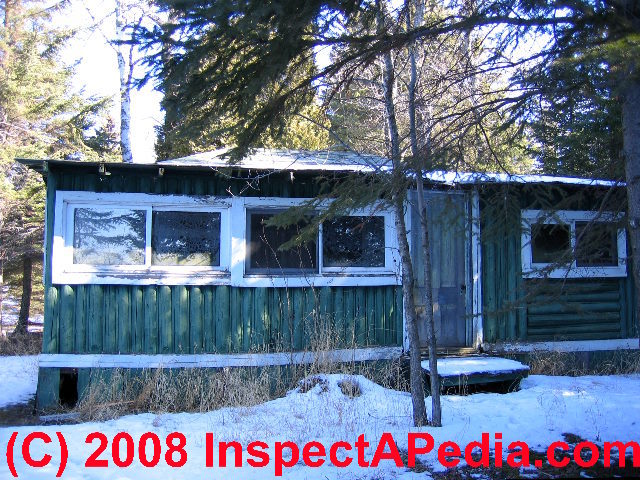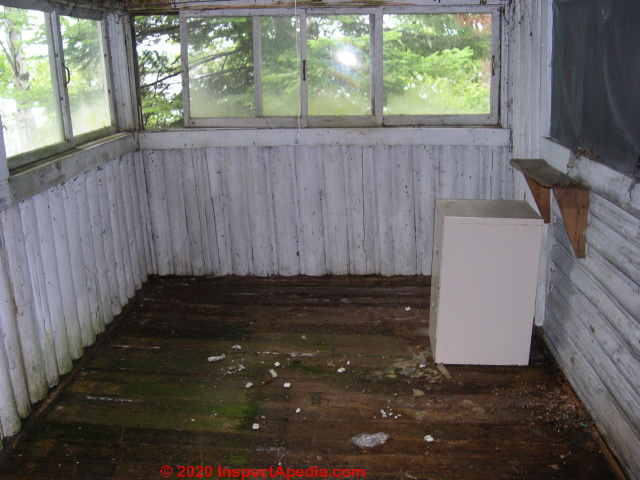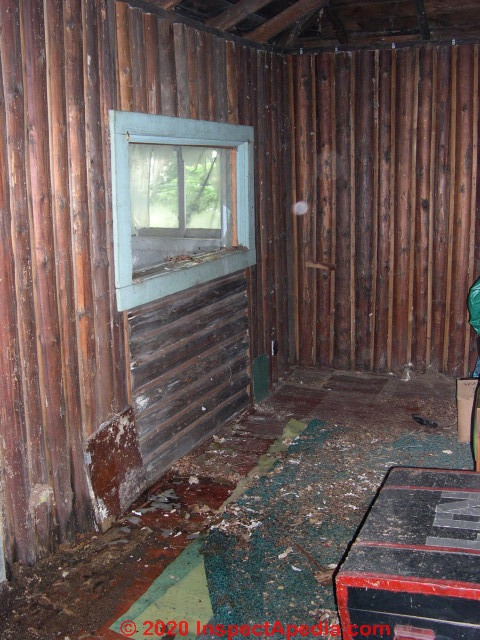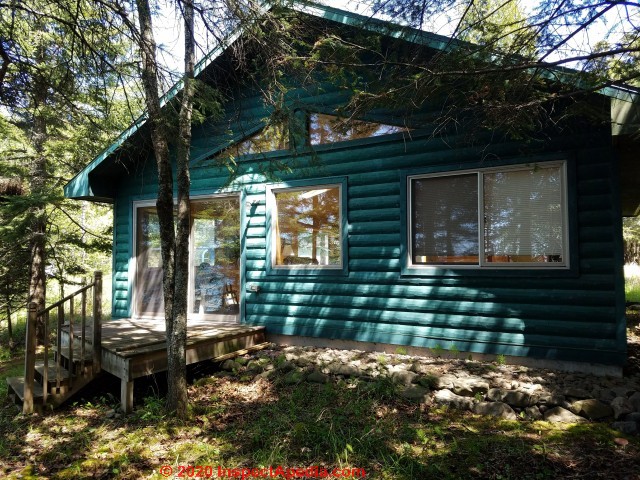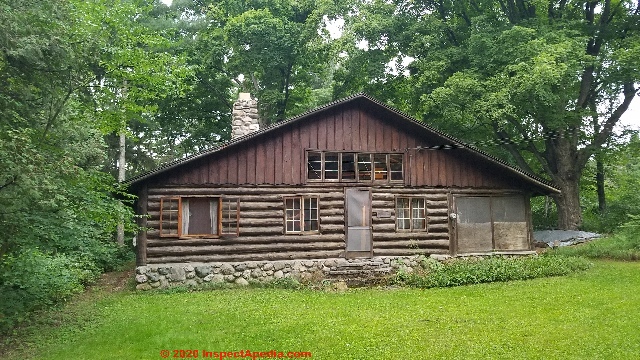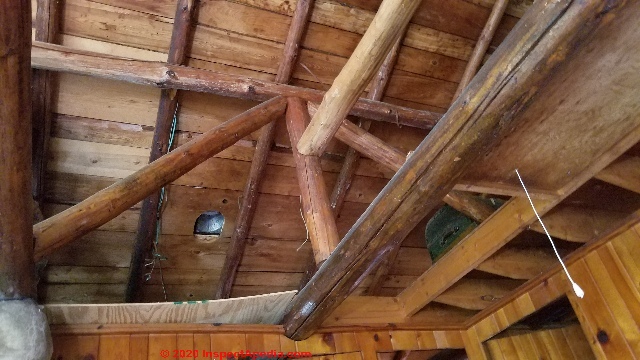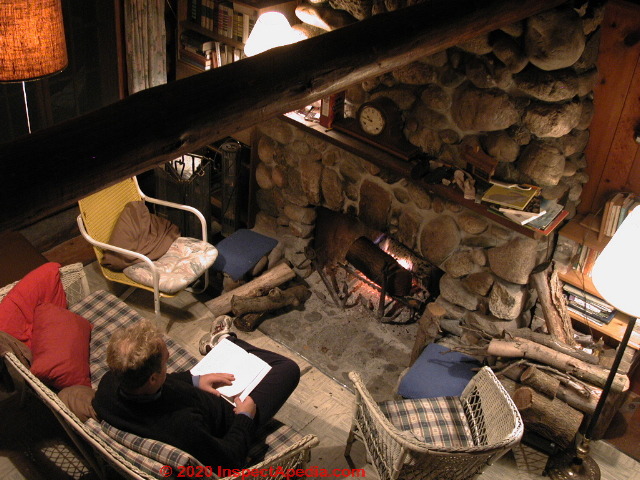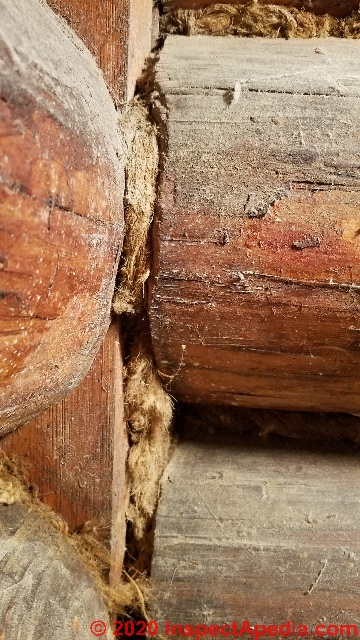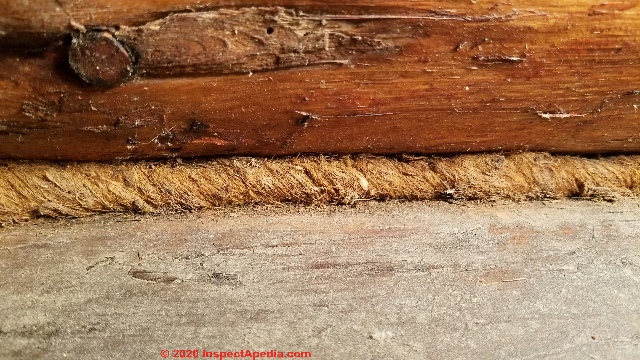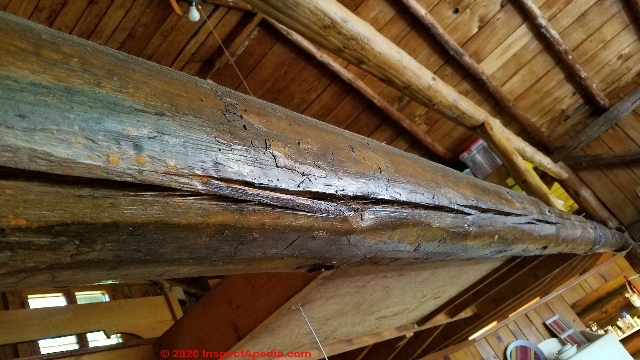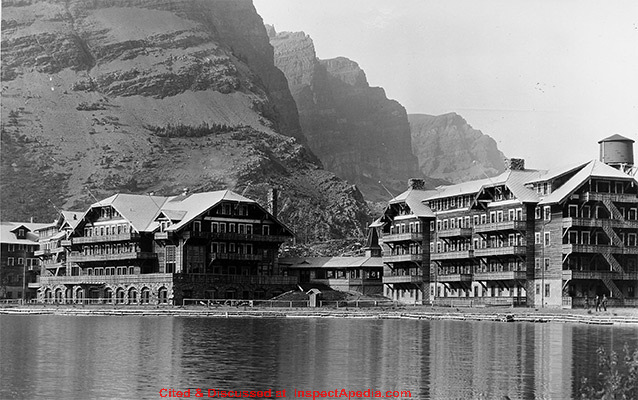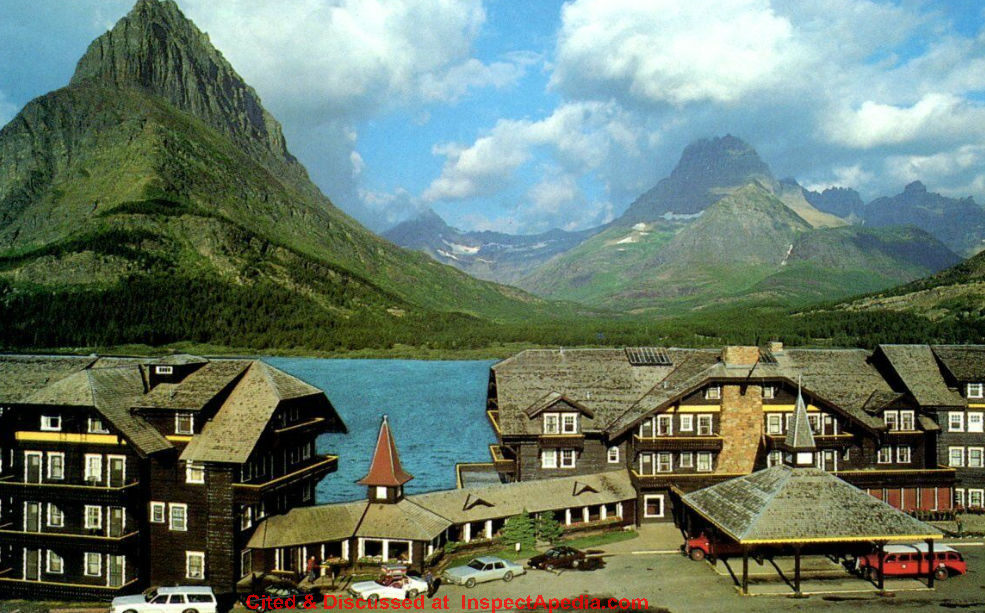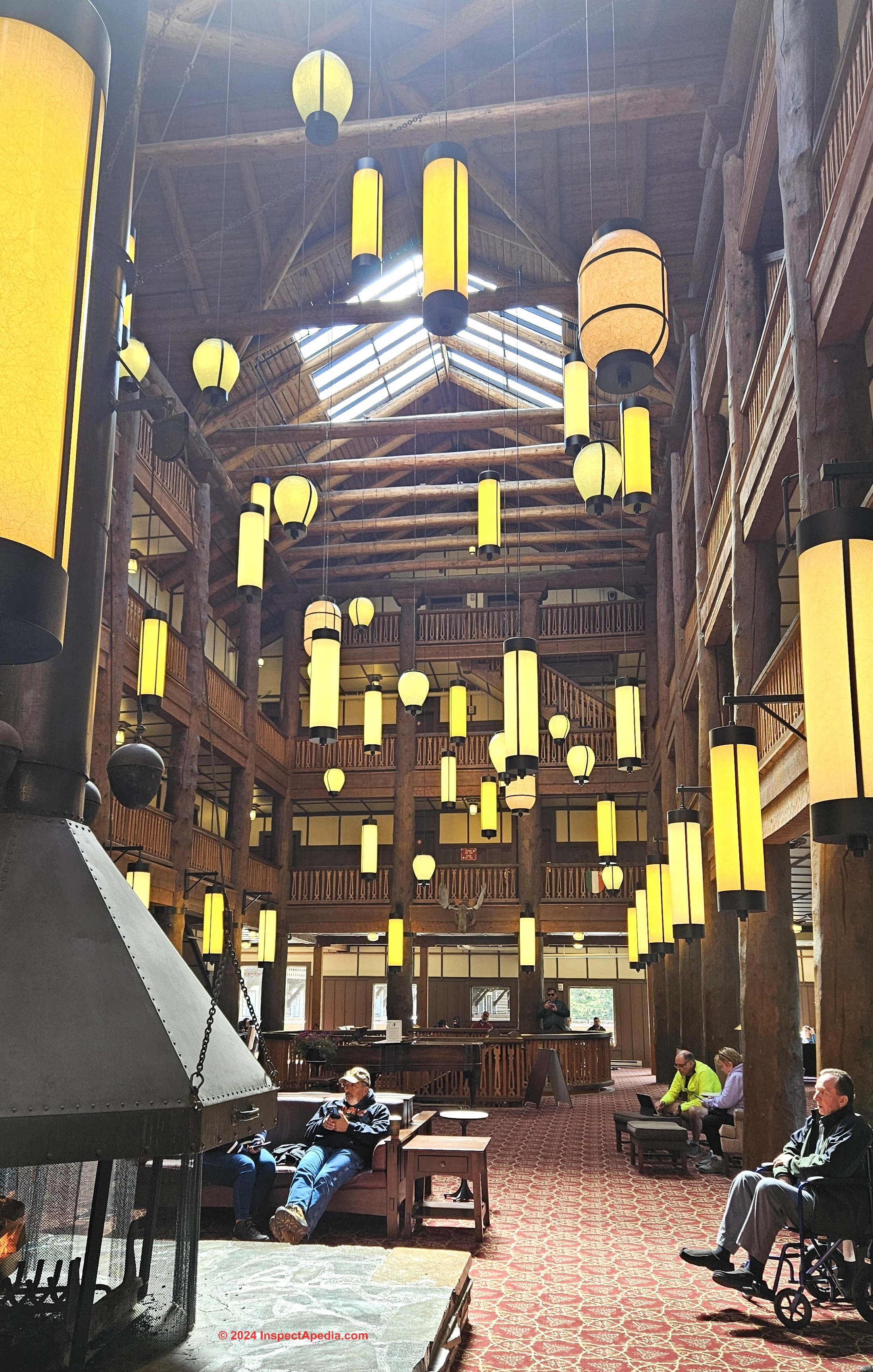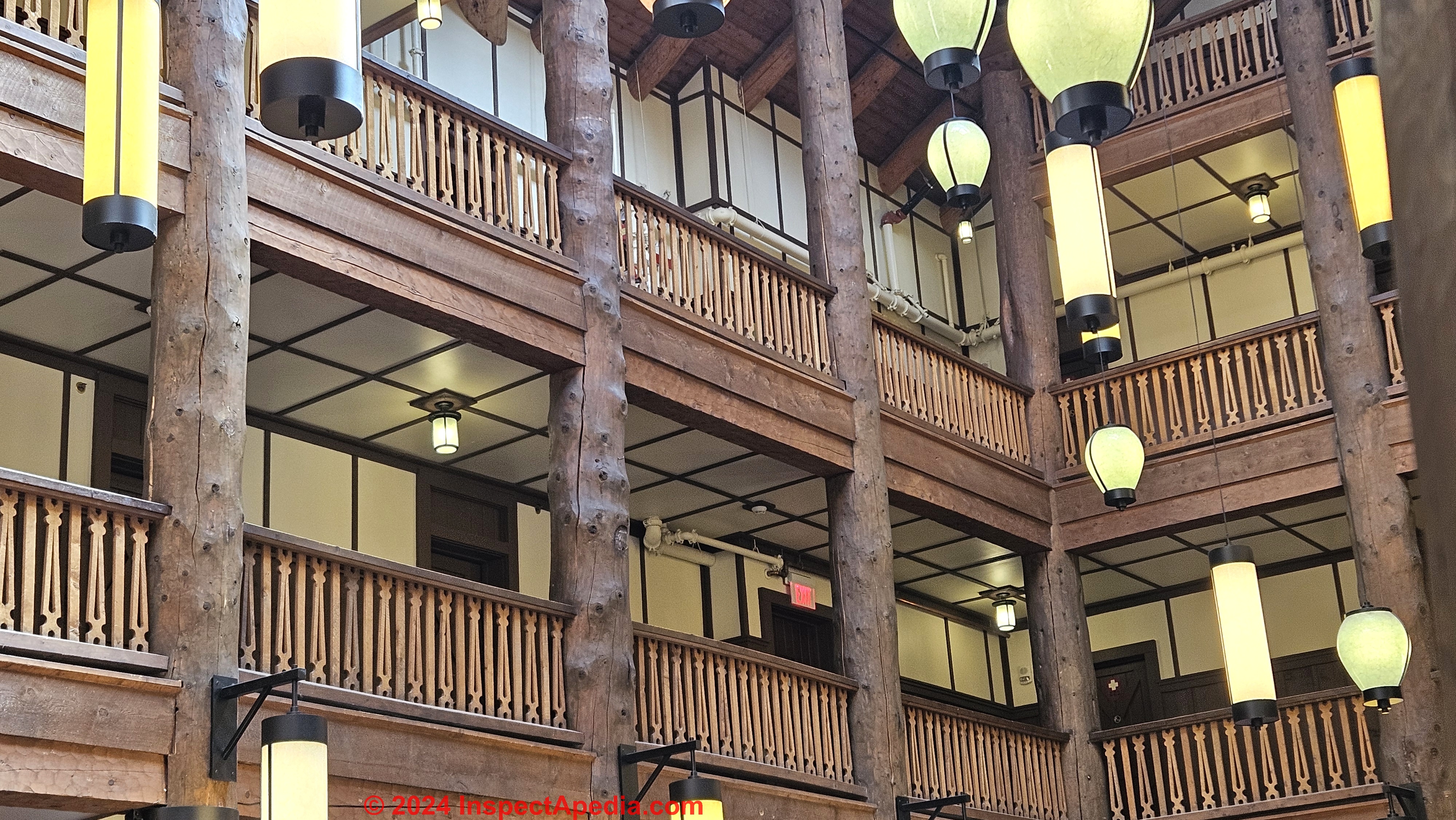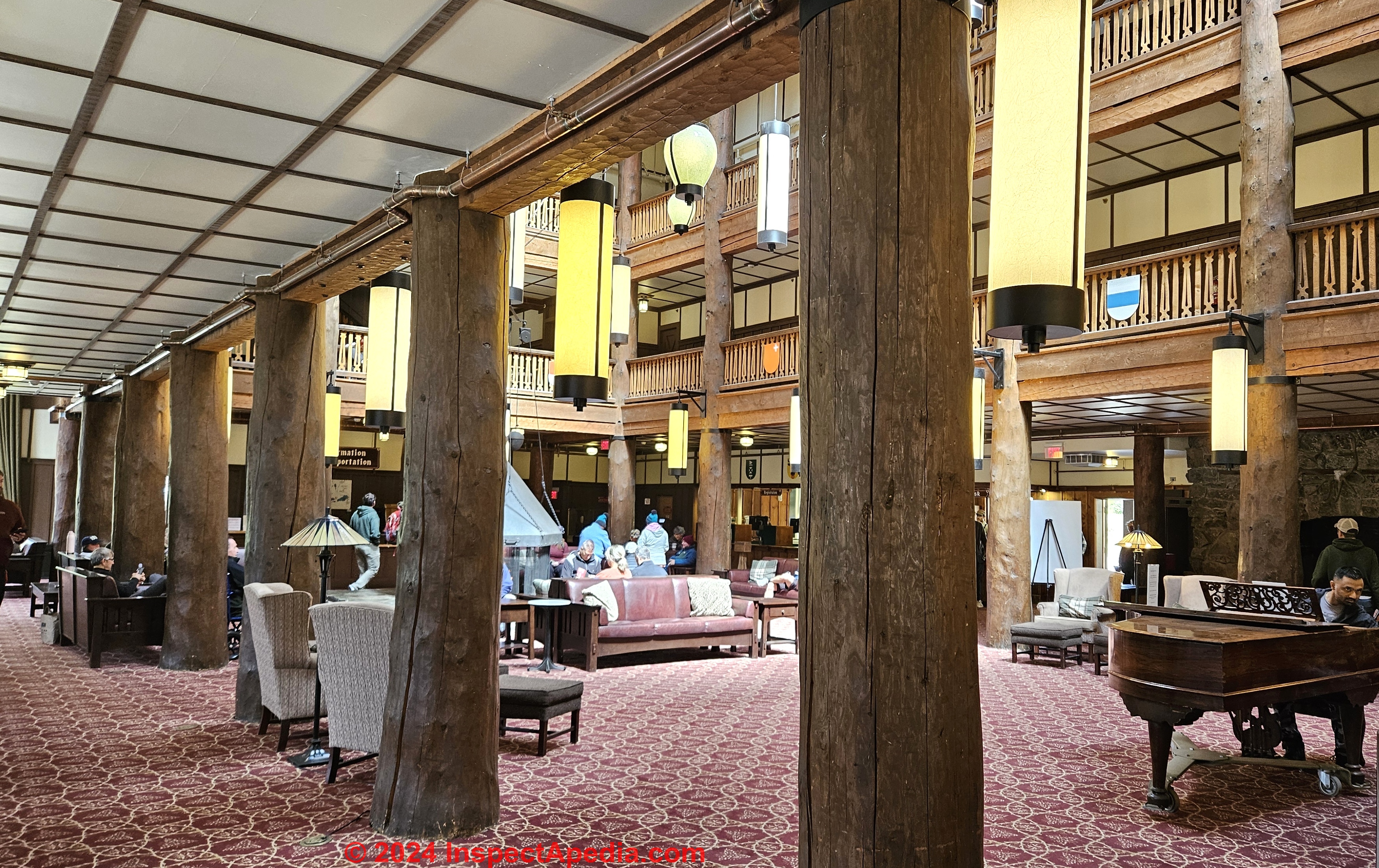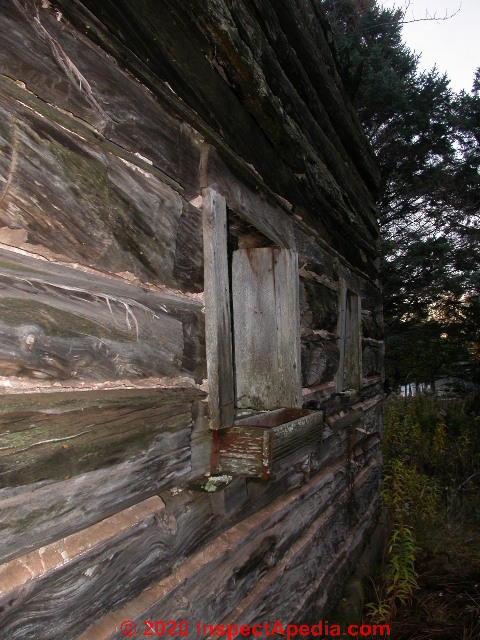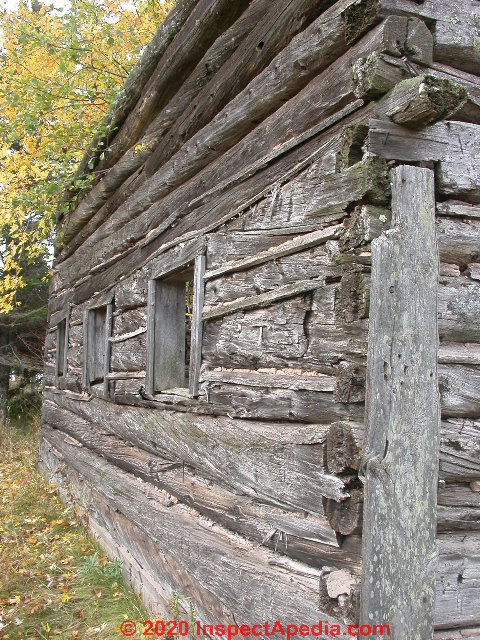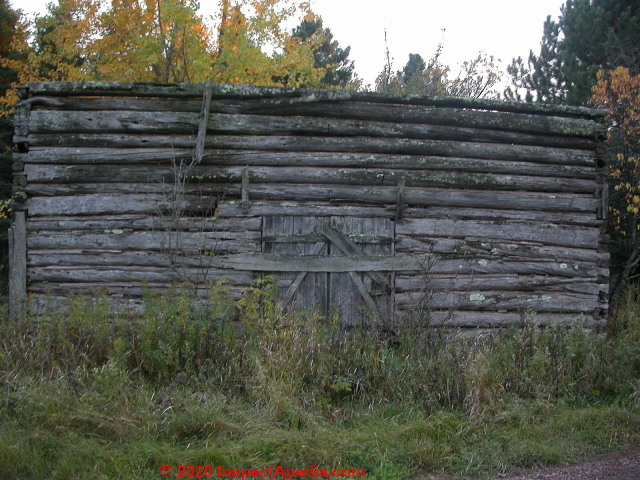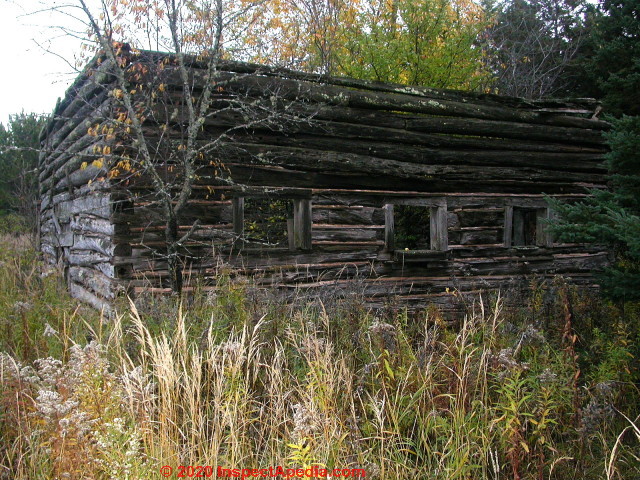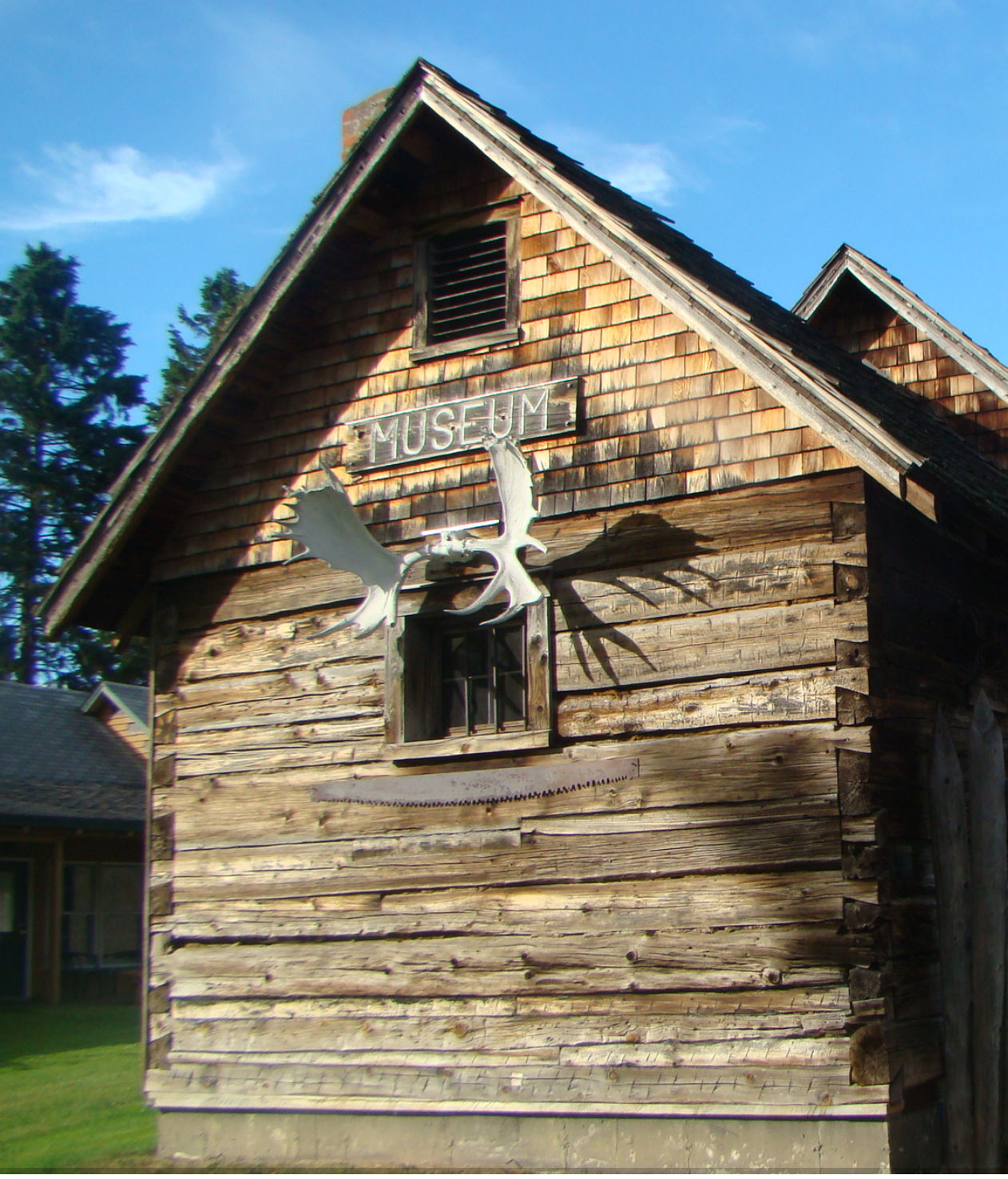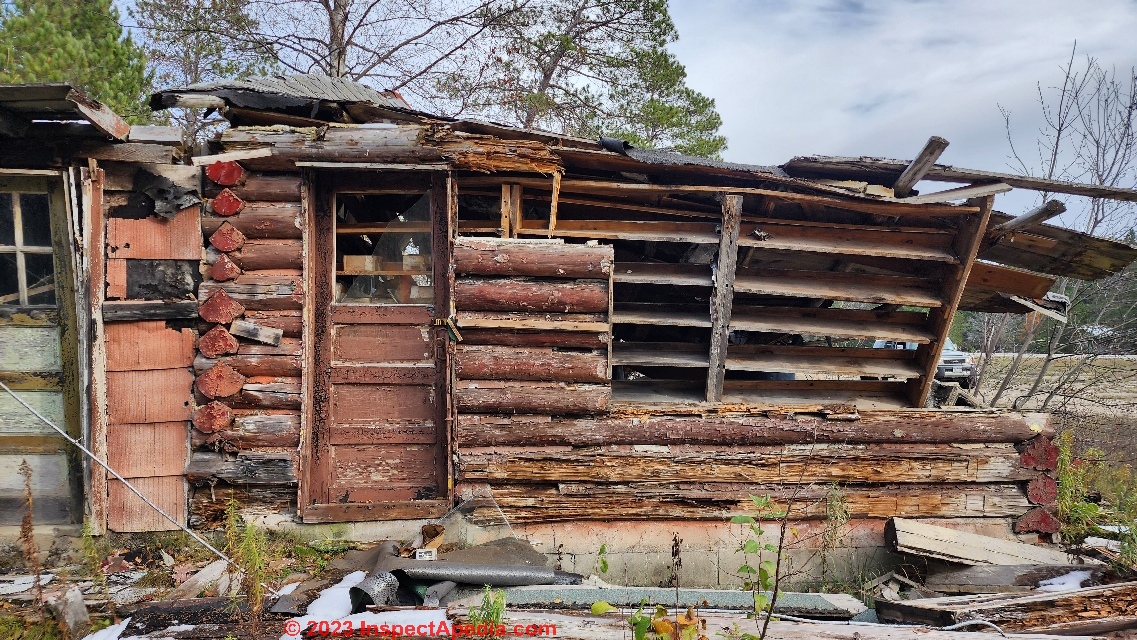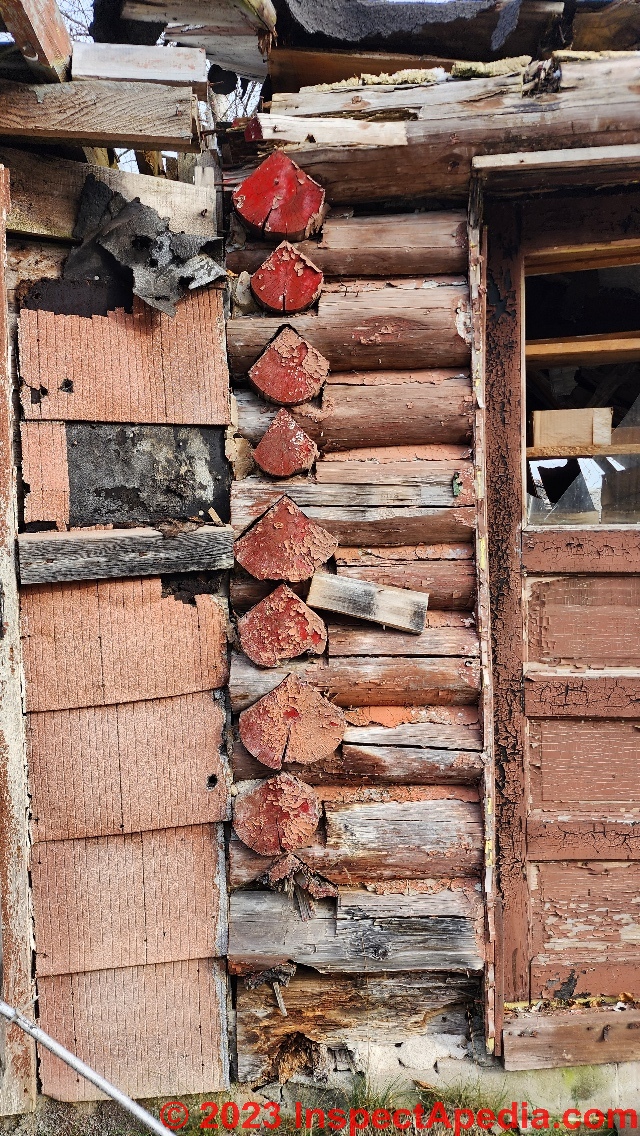 Antique Log Homes
Antique Log Homes
Inspect, troubleshoot, & repair antique log homes
- POST a QUESTION or COMMENT about the history, construction, repair & maintenance of old, historic, or antique log buildings
Antique & traditional log cabins & homes:
This article explains the inspection and diagnosis of rot and leak damage on older log homes and other log structures.
This series of articles provides information on the inspection and diagnosis of damage to new and older log homes and includes description of log home insulation values and alternatives, and also a description of the characteristics of slab-sided log homes.
Our page top photo shows an antique log cabin in Molde, Norway.
InspectAPedia tolerates no conflicts of interest. We have no relationship with advertisers, products, or services discussed at this website.
- Daniel Friedman, Publisher/Editor/Author - See WHO ARE WE?
Guide to Inspection & Damage on Old & Antique Log Home Diagnosis & Repair Guide
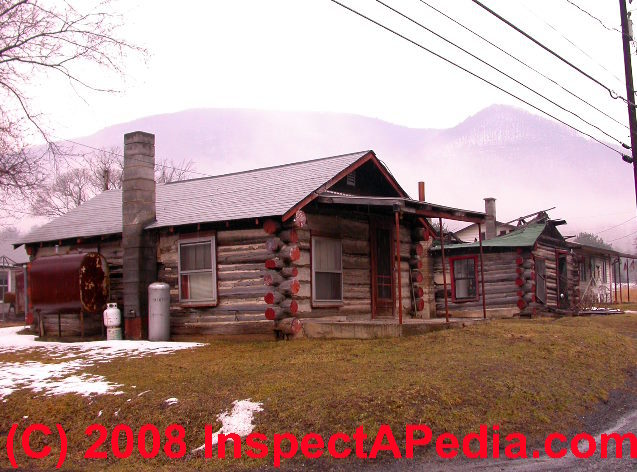 The antique log cabin shown in this photo was found along the Susquehanna River in Pennsylvania during a log cabin driving tour we took in 2007.
The antique log cabin shown in this photo was found along the Susquehanna River in Pennsylvania during a log cabin driving tour we took in 2007.
In photos and with comments below we point out some of the construction techniques and the resulting condition of these homes.
These small cabins varied considerably in condition; the second cabin in this row was collapsing, almost certainly because its owner did not maintain the roof, which was collapsing when we found these homes.
The principal causes of extensive rot damage we observed on this string of log cabins along the river included:
- Failure to keep the roof intact, letting water enter the structure and run down both sides of the log walls
- Logs at ground level not protected from soil contact
- Leaks around the chimneys, sending water down the logs behind and abutting the chimney
Rot at the ends or at lap joints of logs in an antique log homes is a principal point of damage on these structures, as evident in this photo (left) of an antique log structure in Molde, Norway.
...
Notice that it was the lower splice log that has suffered most in this construction detail.
Notice the careful detailing at the log ends in this photo of another antique log structure in Norway?
Those sloping covers and sloping sides of wood piers shed water to extend the life of these wood members.
Below we show what happens when the ends of logs are not properly protected from water uptake.
Here we show that a simple stone slab can break the insect and water path between the supporting structure of a log home and its wooden pier.
This construction detail was observed in many log homes in Norway.
The Green Cabin
This vertical log walled green cabin was built in the 1920s as a fishing getaway,
yet contained rudimentary plumbing that was not retained eighty years later when the building was renovated.
Above: the vertical and horizontal log walls are shown from the cabin's interior.
More details of the original structure are
When the cabin was repaired in 2006, wall by wall, and then the roof, the owners eliminated its crawl space by pouring a concrete slab, then converted from vertical to horizontal log slab siding (below).
The footprint of the original structure was retained. Later we found the remains of a larger front porch that had extended across the original cabin, extending out three meters - not present in these photos.
This remains in frequent use as a dry (no plumbing) guest cottage.
The Elk Lake Cedar Log Cabin
This cabin, located in northern Michigan, was constructed by a group of friends in the mid 1930s. In exchange for their labor, the original workers were given adjoining plots of land.
The logs used to build this cabin were harvested right on the site and local stones carried to build a large center chimney with an enormous thermal mass.
The principal bedroom, located behind this fireplace, benefits from the heated stones - or did.
Jute or Hemp Log Chinking
Below: Original hemp log chinking is visible inside where we show as well a log corner detail: these logs were butted or possibly mortised into a squared vertical post.
Below:
Normal log splits or checking are found in nearly all logs. The absence of sagging in master log joists that span the full width of this cabin and that have been in place since 1935 testify that log checking is not a structural worry.
This Michigan cabin was still in use in 2020.
Many Glacier Hotel in Glacier National Park, Montana
The Many Glacier Hotel in Glacier National Park sits on the shore of Swiftcurrent Lake with breathtaking views of the surrounding mountains and rocky lakeshore. Completed in 1915, it has long served as a premier destination for visitors to the park.
(Historical photos courtesy of https://www.historichotels.org/us/hotels-resorts/many-glacier-hotel/history.php)
The outside of this four story hotel resembles a Swiss chalet and the inside boasts a magnificent towering lobby. All around the lobby are huge knobby cedar logs which serve as roof and ceiling beams and upright lobby and upper floor columns.
As you can see in the photos, these logs are incredibly thick, some with a circumference of 8 feet or more. These logs were brought by train from the West Coast.
Normal log splits or checking are found in nearly all the logs, both beams and posts. The size and weight of this hotel and its logs that have been in place and in continuous use since 1915 testify that log checking is not a structural worry.
Madeline Island Wisconsin Log Cabin
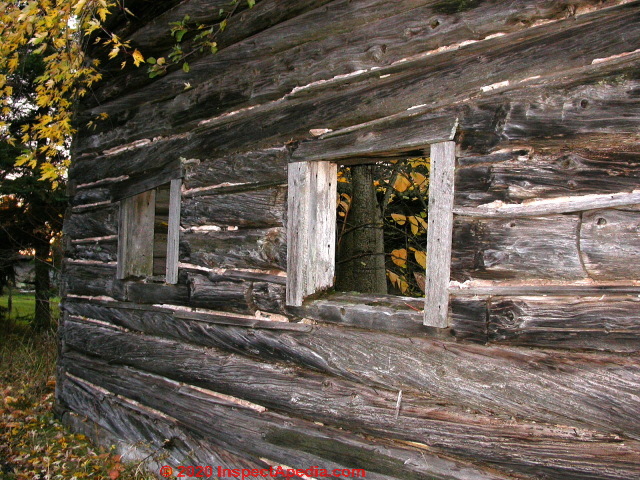 Antique Log Walls Are Still Standing after Roof Long Gone
Antique Log Walls Are Still Standing after Roof Long Gone
Once the roof has been lost most buildings do not stand very long, but this log structure, found near the northeast corner of Madeline Island, Wisconsin.
Madeline Island, named for Madeleine Cadotte, daughter of Chief White Crane and wife of fur trader Michael Cadotte, is in Lake Superior, part of Ashland County, Wisconsin, and has been historically a spiritual center of the Lake Superior Chippewa.
The island was "discovered" by French explorers in 1659, and first settled by Europeans, French fur traders in 1693; Jacob Astor's American Fur Company established a location on the island in 1808 and by 1834 had settled at LaPointe.
These log building remains still sport three walls of the original structure. We think that's in part because of the particular logs used (possibly cedar) and because of the log joinery that produced strong joints at the building corners.
Nails visible in the photos are mostly modern round wire nails, but the structure is clearly considerably older. Clinched cut nails are just visible in the barn-type doors in our last photo below.
[Click to enlarge any image]
We found the logs of this old log building unusual: note the twisted grain.
Above: the log chinking appears to have been further covered with furring strips that themselves were nailed on a cant so as to help water drain off of the wall.
This interesting log structure demonstrates a skilled hand at those dovetailed corner joints between log courses.
Below: the double doors suggest this building, at some point of its life, may have been used as a barn.
Above and below: notice that the builders were not intimidated by having to use logs that were twisted or tapered.
Other log structures on Madeline Island are still in use, including some vacation rental properties in La Pointe, and the Madeline Island museum.
In the photo below of a building at the Madeline Island Museum, notice the dovetailed joints and flattened surfaces of the logs.
Photo above: Wikipedia, 2020/11/16
Madeline Island Log Structure Sources:
- Madeline Island Chamber of Commerce, 2020/11/16, original source:https://www.madelineisland.com/madeline-island/island-history/
Excerpt: The island is named after Madeleine Cadotte, daughter of Chief White Crane and wife of fur trader Michael Cadotte. The Ojibwe (Chippewa) and other native peoples made their home here for hundreds of years before European contact.
- "Madeline Island Logging Camp", Wisconsin Historical Society, 2020/11/16 including Image ID: 48940, log cabins photographed ca 1910.
- "Madeline Island Museum", Wikipedia 2020/11/16 original source: https://en.wikipedia.org/wiki/Madeline_Island_Museum
Pines Michigan Wedge-Cut Log Cabin
Located along Route 28 east of Munising in northern Michigan's upper peninsula, this Pines Michigan log cabin had collapsed when we inspected it in early November 2023.
Still the cabin remains contribute several helpful details about log cabin construction methods including just how the builders cut and joined the logs, how log gap chinking was installed, and what efforts were made to protect the exposed log ends from rot.
Details of what we found are
at DIAMOND WEDGE CUT LOG CABIN
Antique & Historic Log Home Preservation & Repair
- Bomberger, Bruce D., The PRESERVATION & REPAIR of HISTORIC LOG BUILDINGS [PDF], Preservation Brief No. 26, U.S. National Park Service, Technical Preservation Services, U.S. Department of the Interior, retrieved 2018/06/17, original source: https://www.nps.gov/tPS/how-to-preserve/briefs/26-log-buildings.htm
Excerpt:
The intent of this Brief is to present a concise history and description of the diversity of American log buildings and to provide basic guidance regarding their preservation and maintenance.
A log building is defined as a building whose structural walls are composed of horizontally laid or vertically positioned logs.
While this Brief will focus upon horizontally-laid, comer-notched log construction, and, in particular, houses as a building type, the basic approach to preservation presented here, as well as many of the physical treatments, can be applied to virtually any kind of log structure.
Found in this article series: Guide to Diagnosing & Repairing Leaks & Other Problems on antique or historic log homes. Guide to Identifying, Diagnosing & Repairing Older & Antique Log Homes. Log caulk, spline, gasket, and coating product guide for antique or restored log homes.
Log checking, cracking, shrinkage, & leaks in antique log homes, historic log cabins, or other old log-framed and sided structures. Window & Door Installation Details for repair or renovation of antique Log Homes can prevent later leaks & Damage. - Grimmer, Anne E., Jo Ellen Hensley, Liz Petrella, Audrey T. Tepper, ILLUSTRATED GUIDELINES on SUSTAINABILITY for REHABIITATING HISTORIC BUILDINGS [PDF] (2011) U.S. Department of the Interior, National Park Service, Standards for Rehabilitation, retrieved 2022/09/2, original source: https://portal.ct.gov/-/media/DECD/Historic-Preservation/03_Technical_Assistance_Research/guidelines-sustainability.pdf
- Goodall, Harrison, LOG CROWN REPAIR & SELECTIVE REPLACMENT USING EPOXY & FIBERGLASS REINFORCING REBARS [PDF] (1989) Preservation Tech Notes Exterior Woodwork No. 3., U.S. National Park Service, Department of Int
- Sheetz, Ron & Charles Fisher, PROTECTING WOODWORK AGAINST DECAY USING BORATE PRESERVATIVES [PDF] (1993) Exterior Woodwork No. 4, National Park Service, U.S. Department of Interior, Denver Service Center, Design & Construction, 12795 West Alameda Parkway, P.O. Box 25287, Denver, CO 80225-0287 USA, retrieved 2018/11/16, original source: https://www.nps.gov/tps/how-to-preserve/tech-notes/Tech-Notes-Exterior04.pdf
- US NPS, HISTORIC VIGA RESTORATION USING SCREW-ON VIGAS [PDF] DSC TECHNICAL BULLETIN 04- 05, National Park Service, U.S. Department of Interior, retrieved 2018/11/16, original source: www.nps.gov/dscw/upload/TechBulletin0405-HistoricVigaRestorationScrewOnVigas_AF_010418.pdf
- Additional older traditional log cabins and fishing camps are illustrated and discussed
at VERTICAL LOG WALLS on CABINS & HOMES
and
at CRACKS CHECKS SPLITS in BEAMS, LOGS & POSTS
...
Reader Comments, Questions & Answers About The Article Above
Below you will find questions and answers previously posted on this page at its page bottom reader comment box.
Reader Q&A - also see RECOMMENDED ARTICLES & FAQs
On 2019-02-22 by Charles
Hi!
I own a log house built in the 1700s. It's a cape cod style house and is covered with board and batten siding. That was done by a previous owner. They had framed on the outside and then insulated on the exterior with fiberglass.
My concern is about humidity.
Since the logs are exposed inside will there be much danger in the winter of moisture moving out through those logs and into the insulation thereby causing rot?
I'm sure there must be many cases of this around but I've not personally run into it before.
Any thoughts?
thanks!
On 2019-02-23 - by (mod) -
I agree that what you describe sounds risky,
Perhaps you could show us some photos of the cabin exterior and a sketch of the wall cross section
Question: what are the random peg holes in some of my logs
(Mar 9, 2014) kay said:
I have restored a 2 story antique log home , built approx. 1800's my question is this: I don't know what the round peg holes are for in some of the logs. they are random inside and outside , some are close to the bottom log and then few are at top of some logs. This is a mystery I'd like to have solved. Thank you
Reply:
Kay,
Use the CONTACT link to send me some sharp photos of the wall showing the situation and closeups of the holes showing pattern, diameter, and maybe you could tell me depth. If they were drilled and depending on location they may have been to hold pegs for hanging items. If they were at joints they may have been treenails used to secure log connections or log to beam connections.
...
Continue reading at CRACKS CHECKS SPLITS in BEAMS, LOGS & POSTS or select a topic from the closely-related articles below, or see the complete ARTICLE INDEX.
Or see these
Recommended Articles
- AGE of a BUILDING, HOW to DETERMINE - home
- CRACKS CHECKS SPLITS in BEAMS, LOGS & POSTS
- GLUES ADHESIVES, EXTERIOR CONSTRUCTION
- LOG HOME GUIDE - home
- AIR LEAK DETECTION TOOLS
- ANTIQUE & OLD LOG CABINS
- CRACKS CHECKS SPLITS in BEAMS, LOGS & POSTS
- DIAMOND WEDGE CUT LOG CABIN
- ENERGY EFFICIENCY of LOG HOMES
- INSULATION R-VALUE, SOLID LOG WALL
- KIT HOMES, Aladdin, Sears, Wards, Others
- LEAK DIAGNOSIS & CURE in LOG HOMES
- LOG HOME CONSTRUCTION
- LOG HOME WALL INSULATION VALUES
- R-VALUES & THERMAL MASS in LOG HOMES
- ROT, TIMBER ASSESSMENT
- SEALANTS CAULKS COATINGS for LOG HOMES
- SHRINKAGE & HEIGHT CHANGES, LOG WALL
- SLAB SIDING LOG HOMES
- SPLINE & GASKET DESIGNS for LOG HOMES
- SPLINE GAPS & GASKET OMISSIONS
- THERMAL MASS in BUILDINGS
- VERTICAL LOG WALL CABINS for other antique log cabins
- WOOD BEAM LOG VIGA CRACK REPAIR METHODS
Suggested citation for this web page
ANTIQUE & OLD LOG CABINS at InspectApedia.com - online encyclopedia of building & environmental inspection, testing, diagnosis, repair, & problem prevention advice.
Or see this
INDEX to RELATED ARTICLES: ARTICLE INDEX to BUILDING STRUCTURES
Or use the SEARCH BOX found below to Ask a Question or Search InspectApedia
Ask a Question or Search InspectApedia
Try the search box just below, or if you prefer, post a question or comment in the Comments box below and we will respond promptly.
Search the InspectApedia website
Note: appearance of your Comment below may be delayed: if your comment contains an image, photograph, web link, or text that looks to the software as if it might be a web link, your posting will appear after it has been approved by a moderator. Apologies for the delay.
Only one image can be added per comment but you can post as many comments, and therefore images, as you like.
You will not receive a notification when a response to your question has been posted.
Please bookmark this page to make it easy for you to check back for our response.
IF above you see "Comment Form is loading comments..." then COMMENT BOX - countable.ca / bawkbox.com IS NOT WORKING.
In any case you are welcome to send an email directly to us at InspectApedia.com at editor@inspectApedia.com
We'll reply to you directly. Please help us help you by noting, in your email, the URL of the InspectApedia page where you wanted to comment.
Citations & References
In addition to any citations in the article above, a full list is available on request.
- Thanks to Arlene Puentes for the photograph of a checked log in a log home exterior. Arlene Puentes, a licensed home inspector, educator, and building failures researcher in Kingston, NY. Photographs © Arlene Puentes 2006 All Rights Reserved. Text © Daniel Friedman Arlene Puentes 2008 All Rights Reserved.
- "Shop Talk," Martin Mintz, AIA, Builder Magazine, April 1986, detailed solutions for log shrinkage movement by using a "T" jamb at windows and doors. A January 1986 Builder Magazine article shows window installation details in 8" thick log walls.
- "Caulking, Chinking, Insulators, Sealants - which System works Best," Log Home and Alternative Housing Builder, Nov-Dec 1983.
- Lincoln Log Homes Marketing, Inc., 6000 Lumber Lane, Kannapolis NC 28081 704-932-6151
- Insulating Characteristics of log homes were neatly summarized by Roger Rawlings in "Log Homes in a New Light," Rodale's New Shelter, April 1983, p. 28
- In addition to citations & references found in this article, see the research citations given at the end of the related articles found at our suggested
CONTINUE READING or RECOMMENDED ARTICLES.
- Carson, Dunlop & Associates Ltd., 120 Carlton Street Suite 407, Toronto ON M5A 4K2. Tel: (416) 964-9415 1-800-268-7070 Email: info@carsondunlop.com. Alan Carson is a past president of ASHI, the American Society of Home Inspectors.
Thanks to Alan Carson and Bob Dunlop, for permission for InspectAPedia to use text excerpts from The HOME REFERENCE BOOK - the Encyclopedia of Homes and to use illustrations from The ILLUSTRATED HOME .
Carson Dunlop Associates provides extensive home inspection education and report writing material. In gratitude we provide links to tsome Carson Dunlop Associates products and services.


